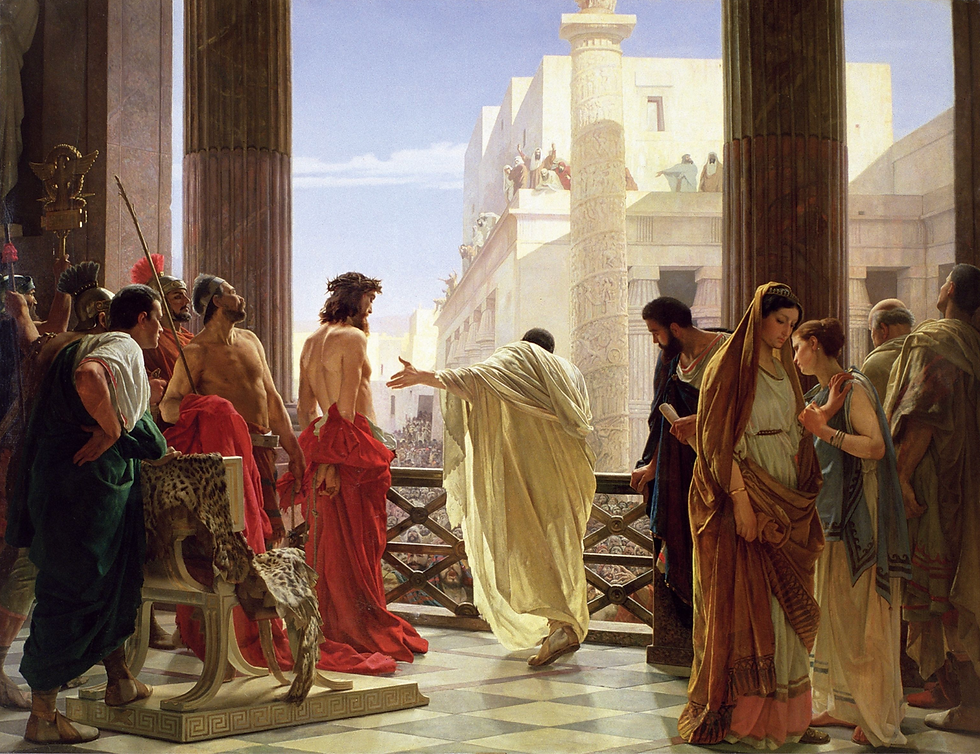
“If you are the Christ,” they said, “tell us.”
Jesus answered, “If I tell you, you will not believe me ...”
They all asked, “Are you then the Son of God?”
He replied, “You are right in saying I am.”
Then they said, “Why do we need any more testimony? We have heard it from his own lips.”
… So Pilate asked Jesus, “Are you the king of the Jews?”
“Yes, it is as you say,” Jesus replied.
Then Pilate announced to the chief priests and the crowd, “I find no basis for a charge against this man.”
(22:67-71 and 23:3-4)
-
Two positive statements of identity from Jesus yield two differing responses from those in power. The religious leaders are shocked and offended, ready to condemn. The secular authority, Pilate, seems to see no significance in Jesus’ statement at all.
Yet these mixed perceptions don’t change the reality of his person. He is truly Christ and Son of God and King.
Meanwhile, the battle plays out between offense and indifference. The religious elite conspire to silence this one who has so offended their sensibilities, while Pilate seeks to evade being drawn into what he views as insignificant bother, sending Jesus first to Herod, then seeking to punish him only slightly and thus declare his trial ended.
But offense speaks louder. Indeed, it shouts. Perhaps it’s always so. The violent cries of “Crucify! Crucify!” build one upon another, forcing Pilate’s hand. He sputters his protest against the injustice, but is overwhelmed – “their shouts prevailed” (verse 23).
Yet elsewhere, outside these corridors of power, from the hearts of the powerless, the response more nearly aligns with reality.
Women, powerless in that day, follow behind our suffering Lord, mourning and wailing. What could be more appropriate? The Saviour of the world is going to his death, beaten, reviled, rejected – these women weep.
And on the cross next to the Saviour is one who has no power or position whatsoever. Condemned to death, his time is fading. He owns his guilt, knowing he is “punished justly” (verse 41), knowing he is only receiving what he has earned. Yet in that place, with no claim to press, he simply turns to Jesus and says, “Remember me.”
The irony is profound. Those with rank and position and every advantage, miss the moment. Indeed, they become complicit in conspiring against the Lord. But the most powerless of all, with precious few breaths remaining, embraces truth, though present circumstances seem to obscure it. He sees a kingdom coming. He knows the one beside him is supreme. He casts himself on the mercy of this one who, at present, suffers mercilessly.
And in so doing, he himself gains eternity.
-
Dear Lord Jesus, you who are Christ and Son of God and King, I receive you. I declare the truth of your sovereignty. I submit to your Lordship.
In so doing, I give you every remaining breath. It’s not power I have to offer – indeed, I am as broken as the thief. But I turn to you. Remember me.
Thank you that you do.
-
Reflect:
What one action could you take today to tangibly express your belief that Jesus is Christ and Son of God and King?
-
Antonio Ciseri, "Ecce Homo," 1871, Public Domain
Commenti